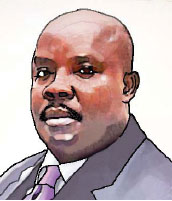By Emeka Alex Duru
(08054103327)
To state that Nigeria’s current security profile is piteous, is perhaps, an understatement. It is rather flat on its back, literally, offering uncertain hopes of recovery, on account of the fluidity of assault on the citizens and other interests in the country. It is not that the security situation has been cheering at any particular stretch of time in the last 10 years since the Boko Haram Islamic fundamentalist group launched its murderous campaigns on the nation. But the regularity and rapidity of attacks on citizens and communities by various armed gangs in different guises in recent time, have further exposed the country’s porous security arrangement.
In the last one week for instance, three reported instances of kidnap, have combined to put in proper perspective the true state of affairs in the country. In what seemed the most recent of the assaults, gunmen on Wednesday, May 1, attacked Government Girls Secondary School, Moriki, in Zurmi Local Government Area of Zamfara State and kidnapped six people. The attackers were said to have abducted two teachers of the school and four nursing students, according reports.
Spokesperson of the Zamfara State Police Command, SP Mohammed Shehu, confirmed the attack, stressing however, that no students were kidnapped by the gunmen but that two caterers and three of their children were later discovered to be missing.
In another but related instance, the same day, the District Head of Daura, President Muhammadu Buhari’s hometown, Musa Umar, was kidnapped by four unidentified gunmen.
Reports indicated that the kidnappers stormed Umar’s Daura residence at 7pm on Wednesday and sporadically shot into the air, scaring the hell out of bystanders, who scampered for safety.
Umar had just returned from the mosque where he took part in the evening prayer when the incident happened.
Umar, said to be the father-in-law of the ADC to President Buhari, was sitting in front of his house with some people when the gun totting men came.
The two cases of abduction, incidentally took place a day after the Chairman of the Board of the Universal Basic Education Commission (UBEC), Muhammed Mahmood, and his daughter were released by their abductors. They were kidnapped on the Kaduna-Abuja highway, around Katari, a village few kilometres from Zuba, an Abuja suburb, on Monday while travelling from Kaduna to Abuja. Their driver was shot dead in the operation.
While the North boiled, the South also had its own story of insecurity within the period. Our reporter, for instance, gathered that gunmen, had on Saturday, kidnapped three oil workers from Canada, Scotland and Nigeria at a rig in Nigeria’s Delta region in what was recorded as the second abduction in the area in less than a week. The operation it was learnt, had struck fear among oil workers in the creeks who feared more attacks in the coming weeks if not checked.
Earlier on Thursday, two Royal Dutch Shell oil workers were kidnapped and their police escorts killed in Rivers State while returning from a trip.
Elsewhere in the North East state of Adamawa, an attack in a community in Madagali Council area, last week, left many dead and property destroyed. In the North Central States of Nassarawa and Benue, though there seems a reduction in the regime of attacks by the Fulani herdsmen lately, the scares of their murderous offensives earlier in the year, remain fresh. Similar story replicates in Enugu and some parts of Anambra.
The immediate result of the uncertain situation, aside loss of life and property, is the drastic fall in the productivity index of the country. It is therefore, not surprising that various reports on statistics about the Gross Domestic Products (GDP) in Nigeria and her relatively lesser endowed neighbours, have seen her trailing behind them. For a country that had prided itself as the giant of the African Continent, this is piteous.
But perhaps, more than this, is that the situation is a sad commentary on the person and administration of President Muhammadu Buhari. While seeking for votes in his first term in 2015, Buhari had anchored his campaign on the trinity of economic enhancement, eradication of corruption and battle against insecurity. Coming on the heels of disaffection among the citizens on grounds of the poor performance of the Goodluck Jonathan administration, Buhari, with his military background and previous experience in office, was easily seen as a reliable alternative. However, four year after, the jury is still out on how far the President and his administration have delivered on those key points.
With an economy that is yet to exit from depression in practical terms, given the rising cost of goods and correspondent poor living standards, lopsided and selective battle against corruption, and obviously uncoordinated efforts at tackling insecurity, Buhari’s tough boy posture that had earned him the respect and admiration of many, is increasingly fizzling out.
The situation becomes more frightening, coming up few days to his inauguration for a second term. The fear is that if in his first term, the uncertain situation is allowed to fester to such a shocking extent, nothing of substance may be done in the second term, when he would not be looking up to Nigerians for votes, having attained the constitutionally allowed two terms in office. This, concerned analysts say, is the bigger challenge, ahead.













